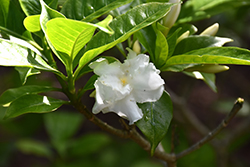Fri & Sat 8am - 8pm
Sun 8am - 7pm
Anytown, USA 12345
fax: 261.787.0463
e-mail: info@successgc.com


Plant Finder

Double-flowered Crepe Jasmine
Tabernaemontana divaricata 'Flore Pleno'
Height: 6 feet
Spread: 8 feet
Sunlight:
![]()
![]()
Hardiness Zone: 10a
Other Names: East India Rosebay, Nero's Crown
Description:
This shrub is very attractive, and features large, glossy deep green leaves, and showy, fully double white flowers year-round, but primarily in spring, ; fruit appears in pairs and ripens bright red; can be grown indoors in colder climates
Ornamental Features
Double-flowered Crepe Jasmine features showy clusters of fragrant white round flowers with gold eyes at the ends of the branches from early to late spring, which emerge from distinctive buttery yellow flower buds. It has attractive dark green evergreen foliage which emerges chartreuse in spring. The large glossy oval leaves are highly ornamental and remain dark green throughout the winter. It produces orange capsules from mid summer to late fall, which fade to red over time. The rough gray bark is extremely showy and adds significant winter interest.
Landscape Attributes
Double-flowered Crepe Jasmine is a dense multi-stemmed evergreen shrub with an upright spreading habit of growth. Its relatively coarse texture can be used to stand it apart from other landscape plants with finer foliage.
This is a relatively low maintenance shrub, and should only be pruned after flowering to avoid removing any of the current season's flowers. It is a good choice for attracting butterflies to your yard. It has no significant negative characteristics.
Double-flowered Crepe Jasmine is recommended for the following landscape applications;
- Accent
- Mass Planting
- Hedges/Screening
- Container Planting
Planting & Growing
Double-flowered Crepe Jasmine will grow to be about 6 feet tall at maturity, with a spread of 8 feet. It has a low canopy with a typical clearance of 1 foot from the ground, and is suitable for planting under power lines. It grows at a medium rate, and under ideal conditions can be expected to live for 60 years or more.
This shrub does best in full sun to partial shade. It does best in average to evenly moist conditions, but will not tolerate standing water. This plant should be periodically fertilized throughout the active growing season with a specially-formulated acidic fertilizer. It is very fussy about its soil conditions and must have rich, acidic soils to ensure success, and is subject to chlorosis (yellowing) of the foliage in alkaline soils. It is somewhat tolerant of urban pollution. Consider applying a thick mulch around the root zone in winter to protect it in exposed locations or colder microclimates. This is a selected variety of a species not originally from North America, and parts of it are known to be toxic to humans and animals, so care should be exercised in planting it around children and pets.
Double-flowered Crepe Jasmine makes a fine choice for the outdoor landscape, but it is also well-suited for use in outdoor pots and containers. With its upright habit of growth, it is best suited for use as a 'thriller' in the 'spiller-thriller-filler' container combination; plant it near the center of the pot, surrounded by smaller plants and those that spill over the edges. It is even sizeable enough that it can be grown alone in a suitable container. Note that when grown in a container, it may not perform exactly as indicated on the tag - this is to be expected. Also note that when growing plants in outdoor containers and baskets, they may require more frequent waterings than they would in the yard or garden.
